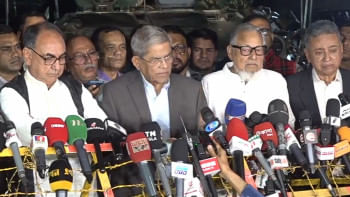THAILAND - Referendum, a new Constitution and bombs

When the "Land of Smiles" was celebrating Queen Sirikit's 84th birthday on August 11, 2016, eleven bombs went off in five popular tourist towns in southern Thailand, killing four locals and injuring dozens, including foreign tourists. The coordinated blasts shocked the nation and panicked tourists ran for cover. Police detained several people, though no one claimed responsibility for the attacks.
Police seemingly downplayed the incident, ruling out the involvement of international terrorists or Muslim separatists. Prime Minister Prayuth Chan-Ocha (former army chief) hinted that it was the work of political opponents to undermine the military government. Incidentally, on August 7, Thailand went for a referendum on the new military-drafted Constitution, which was opposed by several political parties, including the dominant Democrat Party and Pheu Thai Party.
In the past 84 years, i.e. since 1932, when absolute monarchy was abolished, the country had 19 coups and 19 constitutions. The referendum passed the 20th Charter with 61 percent votes, on a turnout of 59 percent. The new constitution, having 279 Articles, was drafted by a non-civilian committee appointed by the junta, known as the National Council for Peace and Order (NCPO).
The junta had actually made all the arrangements to obtain a "yes" vote in the referendum. The Election Commission of Thailand (ECT) is said to have distributed one million copies of the new Charter for Thailand's 40 million voters. There was no open debate about the provisions of the Constitution. The Referendum Act, which provided for up to ten years in jail, actually dissuaded the media from making any criticism of the Constitution. Yet, dozens of people and some journalists were detained and a TV channel banned for supporting the ousted Prime Minister Yingluck Shinawatra. No political meeting or rallies were allowed. However, a summary of the Constitution was released to the media. A majority of Thais was not really expected to understand the ramifications of the provisions of the new Constitution. Clearly, people voted in the affirmative in favour of the junta-established stability.
Certain provisions of the new Constitution have come under severe criticism from the political parties. Most importantly – (i) NCPO shall appoint (not elect) 250 members of the Senate now called National Legislative Assembly (NLA). (ii) Creation of 23-member "National Strategic Reform and Reconciliation Committee" (NSRRC) within the NLA, in which chiefs of the army, navy, air force and national police will be automatic members and shall have executive and legislative powers. NSRRC is supposed to steer the yet-to-be-defined reform process. (iii) The NLA can pass a no-confidence motion against an elected government. (iv) The NLA can select a Prime Minister who is not necessarily elected or even a politician – it can choose even a serving or retired military officer. (v) The NCPO can also issue emergency decrees without parliament's consent – meaning the military will not only control the NLA but also extend its role in the next government. (vi) Politicians charged with "corruption" will be barred from elections – i.e. former PMs Thanksin and Yingluck Shinawtara of Pheu Thai party cannot run for parliament seats.
The new Charter ostensibly has several aspects – it is an anti-corruption mechanism, and strives to ensure national security as well as stability in the Thai economy, which is has not been doing well recently. The military wants to "reset" the political order of Thailand. Political parties, therefore, will have to learn to adjust and probably realign to the new fundamental law of the land.
The referendum on the new draft gives the junta pseudo legitimacy that it has been seeking since overthrowing the elected government in May 2014. The "yes" vote of 61 percent also gives legality to the new Constitution. The military will now have a say in almost every aspect of functioning of the next elected government.
There is an interesting similarity between the military-led governments in Thailand and neighbouring Myanmar. The junta in Myanmar called itself State Peace and Development Council (SPDC); in Thailand the military is known as the National Council for Peace and Order. Parliaments of both countries have unelected military members with enormous legislative powers.
Indeed, the military in both Myanmar and Thailand have become political parties. Instead of taking orders from elected people's representatives, the generals in both these countries are giving orders to the elected representatives. The Constitutions of both Thailand and Myanmar have formalised the role of the military in politics, thereby leading to a travesty of democracy.
Thai politicians in high positions have been frequently accused of massive corruption, which had led to serious political conflicts in the past. The street battles fought between the "red shirts" and "yellow shirts" in 2010 had actually forced the military to intervene. Clearly, Thai politicians have failed democracy. It is interesting to note that Thai politics is stuck in a circular turnstile – party democracy and military rule taking turns in holding state power.
But critics and human rights organisations have strongly criticised the new Constitution for its anti-democratic provisions. The recent bombings clearly seem to be a loud protest against the undemocratic structure of the new Constitution. Though Thailand's political situation remains frayed, the country's socio-religious stability emanates from the revered King Bhumibol Adulyadej (88), the ageing monarch, who has endorsed the new Constitution.
The process to return to elected government has been delayed, as the now defunct National Reform Council rejected the earlier draft Constitution in September 2015. After obtaining people's verdict through this referendum, Prime Minister Prayuth Chan-Ocha said the next general election in Thailand will be held in 2017. The new Constitution has definitely strengthened the military's position in Thai politics. One wonders whether Prayuth Chan-Ocha will lead the next elected government.
The writer is former Ambassador and Secretary.


 For all latest news, follow The Daily Star's Google News channel.
For all latest news, follow The Daily Star's Google News channel. 



Comments